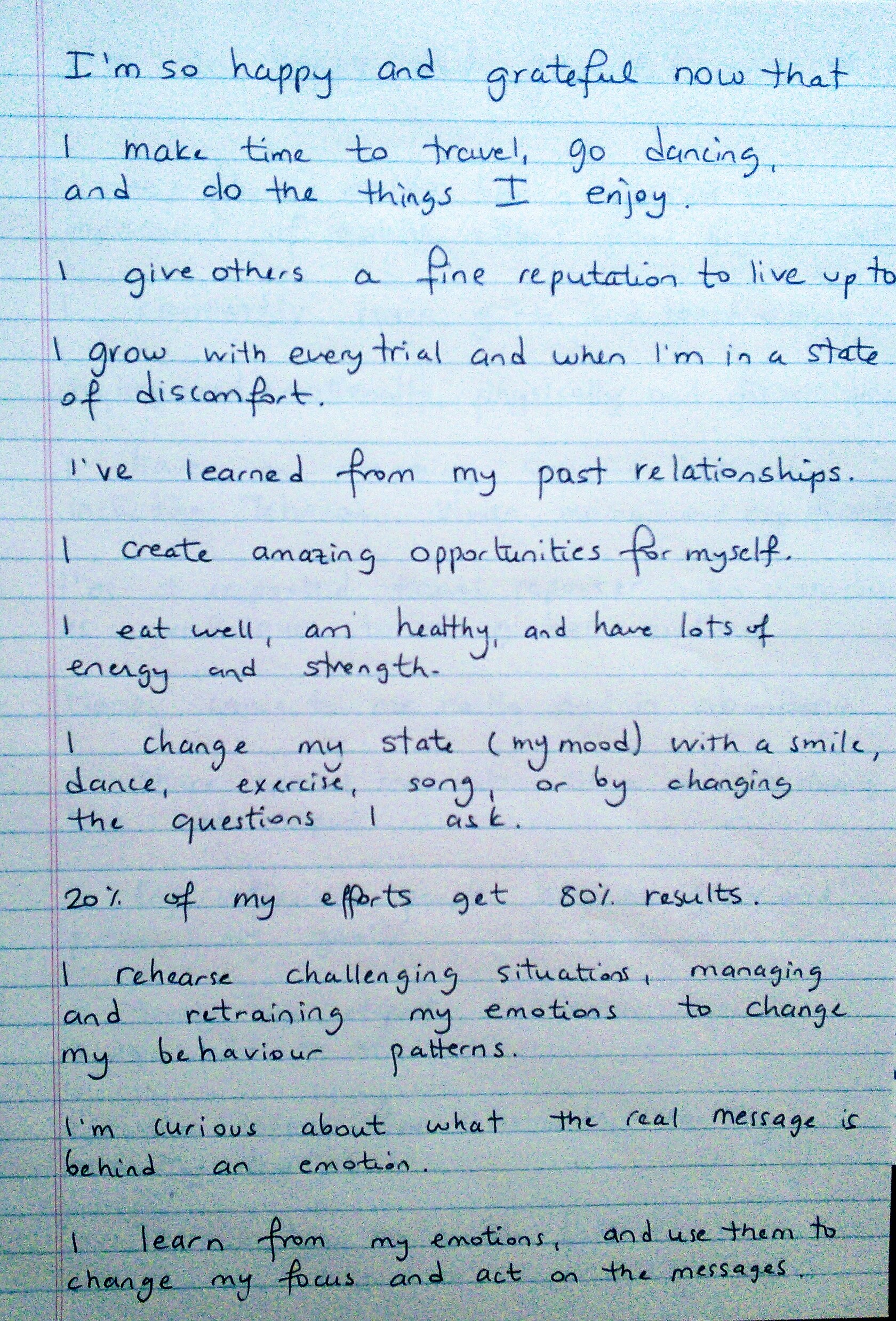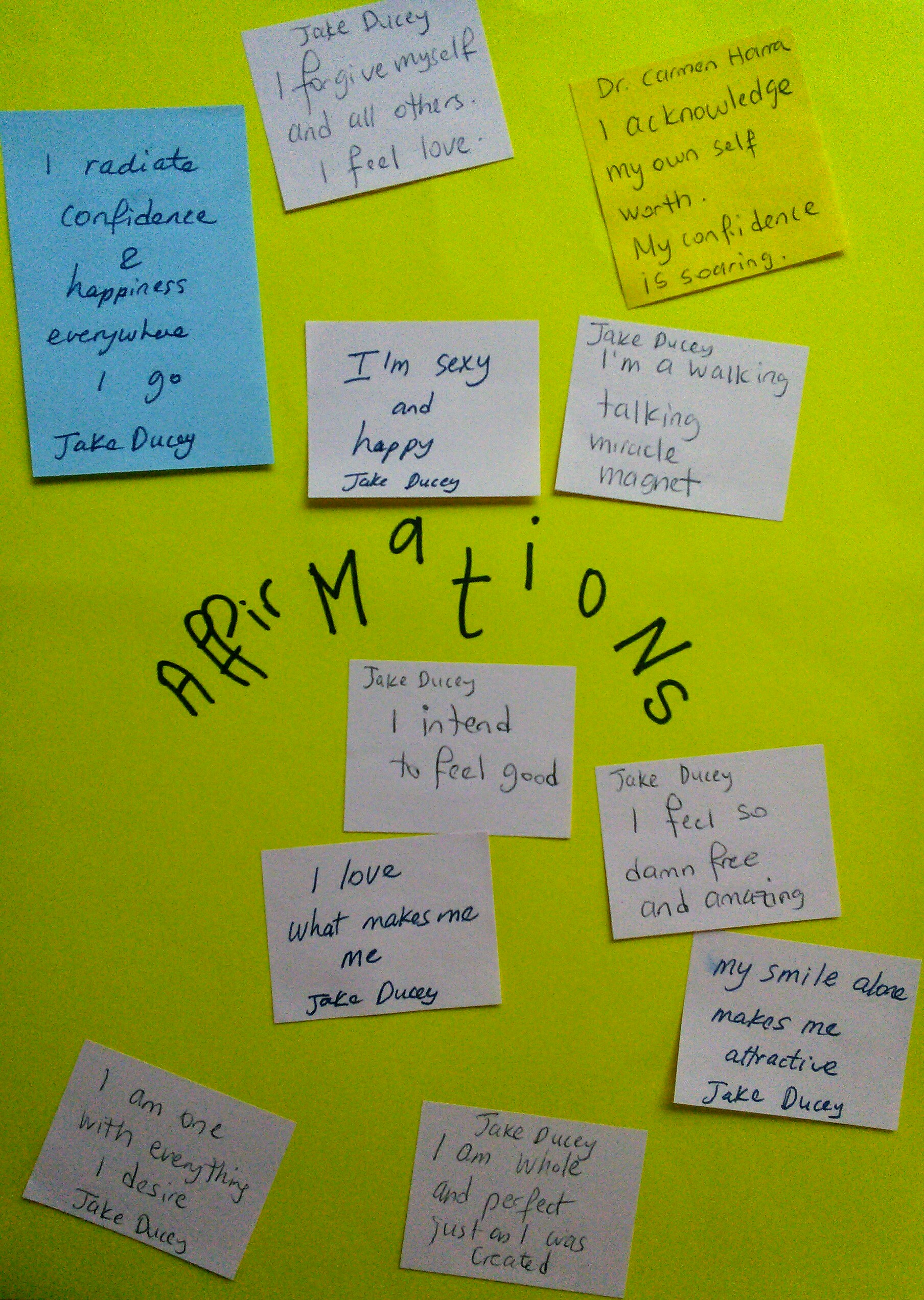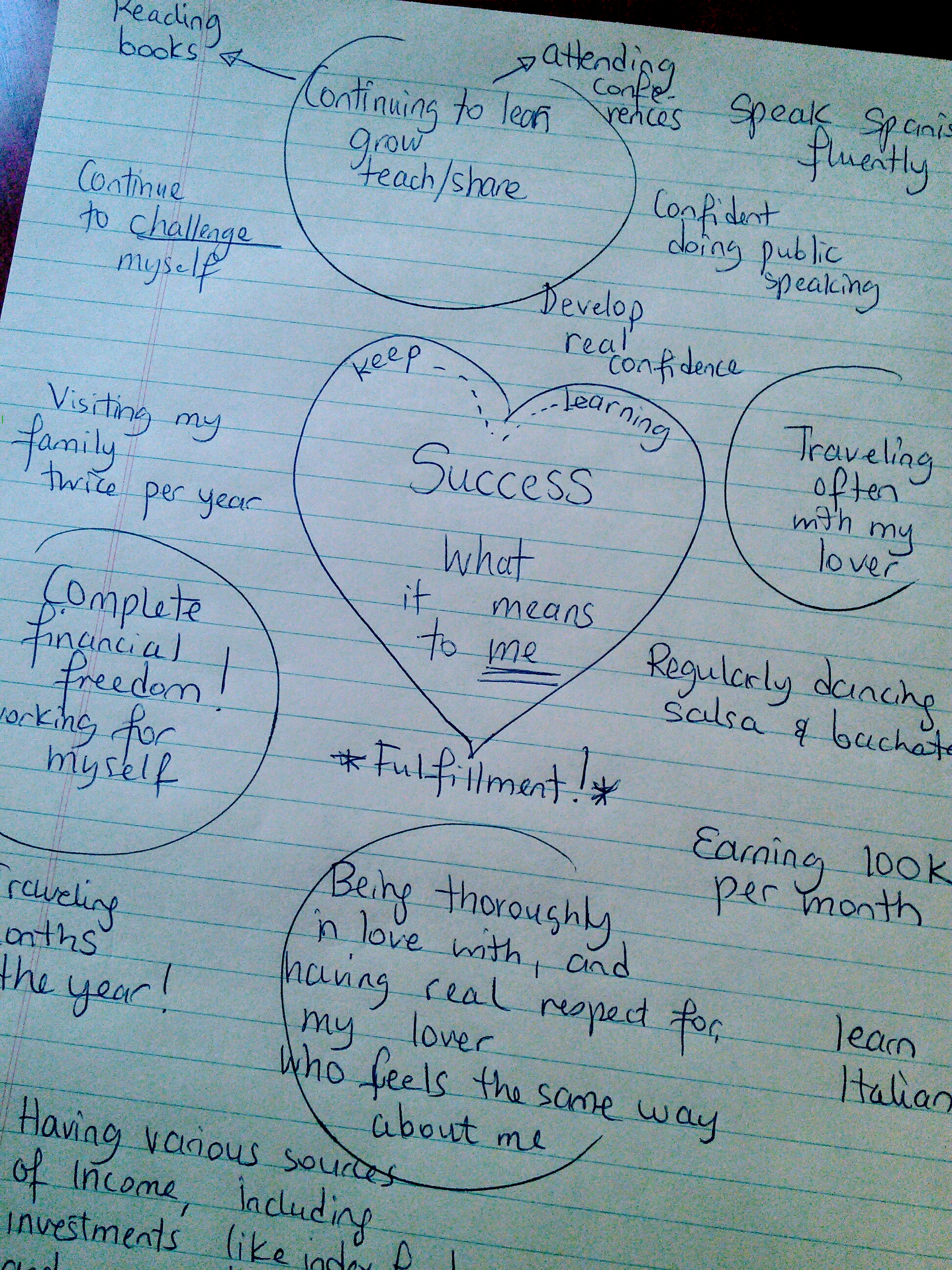In January of 2017, I made a few radical changes to drag me out of a deep abyss of depression doom. As I began making changes, I documented them, writing three articles about learning to invest in myself. My articles presented the steps I was taking to manage my emotions more successfully and help me regain a positive mind-set.
Nearly a year has passed and a lot has changed. For starters, friends are noticing that I am genuinely happy.
So why am I happy? What has changed? This. I daily learn about exciting business opportunities, write articles for fellow world travelers, attend business conferences, participate in dance classes, and make time to be with the people that I care for on the weekends. My drive to charge into these activities stems from one major source, my morning routine.
Since January, I have modified my morning routine various times, and now, I have found a combination which I share here. I feel unstoppable. The world really is my oyster.
Below, I have listed just a few benefits that my routine achieves:
- My morning routine immediately affects my mind-set and creates positivity
- It boosts my self confidence
- It provides opportunity to recognize my blessings, which promotes internal happiness
- It improves my ability to reflect on and build more meaningful relationships
- It increases my focus and productivity for the rest of the day
- It gives me physical and emotional energy and drive
My morning routine entails nine steps, so I often wake at least an hour before I have to to give myself time to do these steps before I get going with my day. I try to do all the steps, but sometimes I omit some, and I’m always willing to try new things to keep my routine fresh and exciting. To give credit where credit is due, the inspiration of these steps comes from various mentors, and these largely include Evan Carmichael, Clark Kegley. Jake Ducey, Hal Elron and Tony Robbins
Here goes. The moment my alarm goes off, I try to adhere to Mel Robbins’ “5 second rule.” Jump out of bed immediately before your brain has a chance to convince your body to remain in bed and waste the next few minutes of your day.
1. Play songs (3-8 minutes)
The minute I’m up, I look for an upbeat, uplifting song. This was recommended by Carmichael, and I simply love this step. Music affects my energy. I play a song or several, loudly, while airing my bed using the washroom and so on. I often choose Latin songs by artists like Gente de Zona, or Jacob Forever. Sometimes, I get so absorbed in the song that I can’t stop dancing or singing along. The great thing about this is that moving my body produces instant endorphins and in my case, pleasure too. So I’m already feeling happy within the first five minutes of waking up. I also like playing songs by artists like U2, Queen and Daddy Yankee. Chose what does it for you!
2. Drink a glass of water
This is another idea that I adopted directly from Evan Carmichael. Since your body dehydrates overnight, you need to hydrate it asap. Just do it.
3. Exercise (10-20 minutes)
I do yoga. While I’m listening to an uplifting tune and drinking some water, I roll out a yoga mat. As the tune’s finishing, I’m transitioning into yoga stretches. I use Ekhart Yoga videos because I like her style, her calm voice, and her large selection of videos for different stretches. I just chose whatever video suits my body for that morning, for example, if I hiked the day prior, I chose a video that focuses on stretching out stiff leg muscles. Yoga in particular has the effect of not only unraveling my sleepy body and giving me strength, but it develops my focus, produces internal heat and gives me brilliant energy, which I’ll need to be productive for the rest of the day.
I usually set an ‘intention’ for the day too. I decide how I want to feel, for example, I might say to myself, “today, I’m going to love and be kind to myself.” I may later write my intention on a sticky note, and carry it on my tablet or wallet to be reminded again and again of the behavior I want to manifest that day.
4. Mediation and/or prayer (5-15 minutes)
Meditation was a difficult one for me initially. I just really didn’t know what I was doing. I started off following guided meditations offered on Ekhart Yoga’s website, which talk you through the steps of how to meditate. After several months of meditation with these videos, these days, I prefer to meditate without guidance. The purpose of yoga is to prepare someone to sit still comfortably, having developed the flexibility in their joints to sit still without pain. For this reason, I always meditate after yoga, rather than prior to.
I use meditation as a chance to switch off my brain and enjoy ‘stillness’, be ‘present’ at this exact moment, without my mind wandering to the past or anticipating the future. I usually focus on my breath going in and out, and listening for any sounds around me or focus on using another of my five senses.
Other times, I prefer to pray. Although I’m not actively Christian, I pray almost daily. I use these moments to ask God for strength to help me with a behaviour goal. For example, sometimes I ask God to help me to continue to give honest and sincere appreciation to the people I come into contact with that day.
I have several personality goals that I want to embody, and often, I pick one to focus on for each day. I also pray for help to work through challenges, explaining the details, and why I need God’s direction. I have personally found prayer to be one of the most helpful sources of comfort and strength, particularly as an expat living away from access to in-person family emotional support.
5. Gratitude Journal (5-10 minutes)
Giving gratitude for what I have, and avoiding comparison with others is my largest source of happiness. I really look forward to this part of my routine. I watched a video only today by Clark Kegley warning about three words to avoid, loss, less and never. These words, are what Jake Ducey would describe as ‘scarcity words.’ When you give focus and energy to ‘lack,’ to ‘need’ and what you don’t have, you can be psychologically programming yourself to perpetual lack, and reinforce a belief that you’re incapable of changing a current financial challenge or attracting more wealth and abundance into your life.
Every morning, I write down three things that I’m grateful for. They may begin like this. “I’m so happy and grateful that I made time to write my blog this morning. I enjoy writing because it gives me pleasure to share what I’m learning with others, and it also helps me clarify for myself what view as important.” Sometimes I write about being thankful for simple things, like the weather, a chance to talk with my mum, the groceries I just purchased and other times, I write about how grateful I am to have particular people in my life. I feel better able to define and savor the smaller details about why I have X person as a friend. As a result of reflecting on these details, I’m better able to show genuine appreciation and respect to the people that mean a lot to me. See Clark Kegley’s explanation on the benefits of journaling .

6. Review Goals (5 minutes)
I’ve only recently realized how instrumental this goal is to work toward progress. You see, other morning routine steps develop a positive mindset and self-confidence, but reviewing goals helps me to consistently evaluate whether I’m using my time wisely, and thus inherently requires me to be working toward some future objective.
Ultimately, we don’t have many hours per day within which we can operate at our prime, namely, when we’re most alert and focused. Personally, my most productive and focused time is between 11am and 1pm every day. I like to write, develop my website or work on business plans during these two precious hours. Many people whittle away their most energetic prime-time at work, making someone else rich. Clark Kegley talks about this in some detail. Before trying to manage your time more effectively, identify when exactly is your most productive time. Then, give thought to what your goals are.
I’ve made short and long term goals, as well as monthly goals. Reviewing these daily helps me see whether I’m making progress. I used Clark Kegley’s journaling advise to define financial and personal goals, and to create separate categories for each to really understand what to work toward. Sometimes, my goals change, but some of them remain consistent. Defining what I wanted was probably the hardest step. See Kegley’s advice on developing goals.
7. Affirmations (3 minutes)
Jake Ducey explains that affirmations are a form of self-hypnotism, a way to reprogram our minds to believe that we are capable of achieving anything. The purpose is to become more self-aware of the negative mantras or subconscious thoughts that we repeat to ourselves over and over, saying things like, “oh, I’m so stupid,” or, “I wish I could do that,” and other negative phrases or words that suggest lack or inability that we repeat to ourselves and actually begin to believe. Positive affirmations do the opposite. See Jake Ducey’s advice here.
To achieve the success that I dream of, I need to change myself. I need to become truly self-confident and believe that I deserve success. General lack of drive and self-expectation allowed me to make excuses, “yes, I’m fine, I can live on this salary, my friends are in similar circumstances” and the excuses went on.
But what I had been doing was imposing barriers on myself. I needed to retrain my subconscious mind to remove these self-imposed barriers, and in response created a list of affirmations which I now read aloud every morning. I even recorded my voice repeating my desired behavior patterns, characteristics, and goals that I haven’t yet manifested but intend to. I like, “I’m so happy and grateful now that I love, respect and value myself; I’m so happy and grateful now that I recognize my self-sabotaging relationship behavior patterns and am changing them; I’m so happy and grateful now that I receive abundant love and support from my partner, my friends and family.”


8. Visualization (5-7 minutes)
I first learned about the power of visualization through Hal Elrod. In his morning routine, he explained that visualization entails taking a few minutes to sit still and imagine how you feel once you have reached your goals. Imagining your day and how it would be at that time. I personally find this is easiest to do once I have defined what my goals are.
My current future goals entail traveling the world with my partner, financially independent and managing ourselves without any boss or confinement to one country. I visualize sitting on the slopping mountain of the Acropolis in Athens, Greece, with an expresso and slice of cake, and a diary or laptop beside me, watching people as they go by. Other times, I visualize traveling to somewhere in S.E. Asia with my partner, spending weeks exploring local villages, eating food, and hopping on the computer to monitor our online businesses as we travel. I did this earlier today, and finished with a huge smile on my face. I know that what I give energy and focus to will manifest itself in my physical world.
At home, I display visual posters with images of destinations I intend to visit, with pictures of happy couples (representing my partner and me), and the home I want to buy in Spain. My posters remind me daily of my goals, the reason for all my efforts, and they help drive me toward accomplishing each goal in little bit-sized steps

9. Learn something: listen to advice (5-30 minutes)
I do this step anytime, and even at night after returning from work. Whether I’m eating breakfast, cooking lunch, or doing my make-up, I’ll pop on a video by any of the mentors that I subscribe to, particularly Clark Kegley, Project Life Mastery, Evan Carmichael, Jake Ducey and Bob Proctor. I listen as I eat or do tasks, and pause to write reminders on post-it notes so I can later remember the advice and add these to posters on my walls.

These nuggets of wisdom are often extracted from life experience, or books and speeches by successful entrepreneurs and life gurus like Richard Branson, Jack Ma, Dale Carnegie, Oprah Winfrey, Mel Robbins, Warren Buffet, Tony Robbins, Elon Musk, and Simon Sinek. These injections of daily ideas and wisdom are invaluable to me because I’m constantly striving to learn and improve.

In conclusion, my energy comes from my morning routine. If you want to inject some fire into your day, I suggest you evaluate your morning routine. What are you doing to strengthen yourself to tackle your day and achieve the results you want?
If my write-up has inspired you to change something, I suggest picking two or three of the most appealing steps I’ve presented here to build a foundation for your solid morning routine, and build from there. A great place to start would be accessing Clark Kegley’s Eleven Questions That Will Change Your Life Forever, to help you define what you want if you don’t know yet. Personally, I find exercise, meditation, reviewing goals and my thankfulness journal are indispensable and I always have to include these. Chose what works for you, but try all of them.
Thank you for taking the time to read this, and I’d love to hear what steps you take to develop emotional strength and set you on a path to your definition of success. Please leave your comments below.
Keep Learning!

Wow Tash
You do soooo many positive things in the morning.. I think I do 3 of these already.. but you definitely take it to the next level!
I doubt anyone can feel negative if they followed your advice..
You should become a positivity guru 😁
Cleanse pleople of their negativity! Imagine what a great would we would live in if everyone did what you do … ❤️
Loved this article xx
Thanks, Viv. It’s great to hear that you do three of these. I take it to the next level because I feel I really have no choice. I do it because it it drives me to keep doing my steps toward my goals, and if I neglect steps for several days in a row, I risk lack of productivity, disappointment in myself, and even feeling low.